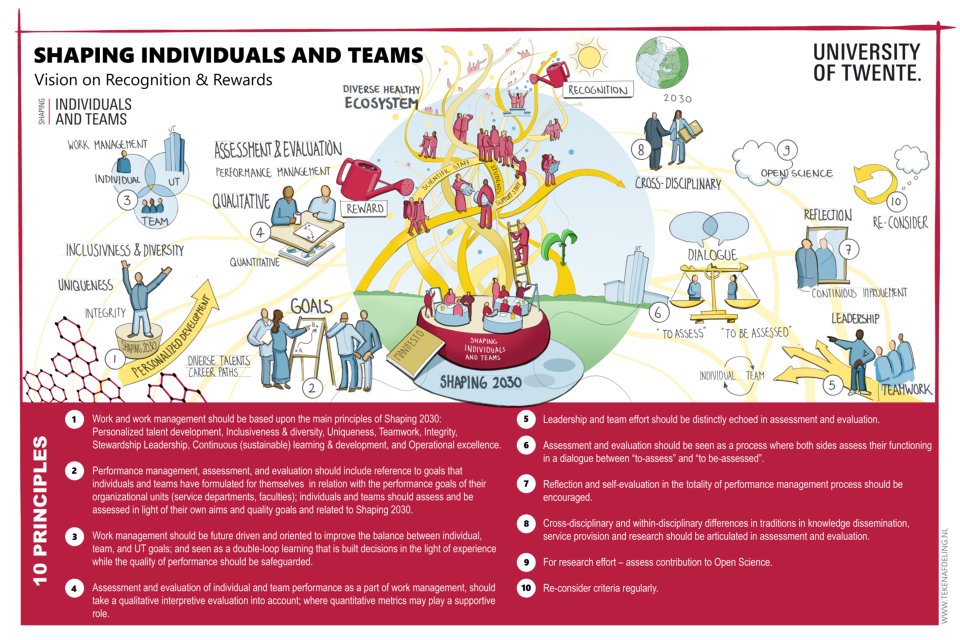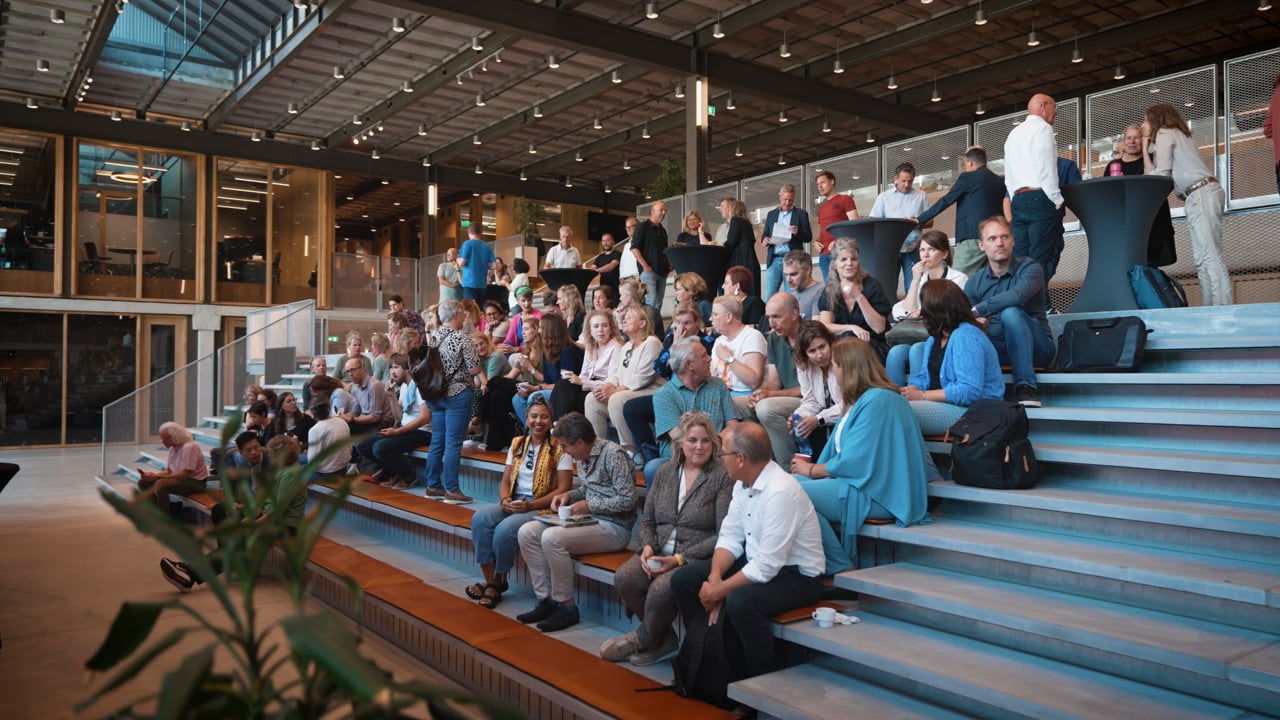Today's societal challenges call for more collaboration, team science and a multidisciplinary approach by scientists. Putting joint ambitions into practice in Dutch academia requires a more specified Recognising and Rewarding of talent and career paths. With this, the UNL calls for modernisation of the assessment system for talent as a prerequisite and started the national programme Recognition and Rewards; Room for everybody's talent. UT takes it broader and sees it as a part of the Talent Development program, where principles of Recognition and Rewards have to be applied throughout the workflow, starting from recruitment and selection, towards exit practices. The modernisation of Talent Development under the principles of Recognition and Rewards is about more focus on impact-driven work in academia, with the predominance of qualitative assessment over quantitative. Ultimately, this is followed by improving the quality of each core area: education, research, impact, leadership and (for university medical centres) patient care.
Recognition and rewards: room for everybody’s talent
In the national programme Recognition & Rewards UNL works with all universities, including UT, university medical centres, reputable research institutes and research funders on five main goals:
- diversifying and vitalising career paths,
- achieving balance between individual and team performance,
- stimulating open science
- stimulating academic leadership,
- focusing on quality, creativity and content instead of quantity
10 UT principles
At UT we go one step further in committing ourselves to rewarding not only academic staff but also supporting staff. In this, we even are a leading example for other universities. The RRteam supports the University of Twente by organising Talkshows, developing concrete tooling and embedding the guiding principles in policies.

Recognition and Rewards in an international context
On May 16, 2023, the DORA (The San Francisco Declaration On Research Assessment) agreement celebrated its 10th anniversary. The DORA agreement, the "Recognition and Rewards" program, and CoARA (Coalition for Advancing Research Assessment) all pertain to changes in the assessment of academic research and/or education. The summarised relationship between these three initiatives is outlined below. DORA is recognised as the global starting initiative, "Recognition and Rewards" as the Dutch initiative, and CoARA as the European initiative. For further information and background, please refer to the respective websites:
In summary, DORA, the Recognition and Rewards program, and CoARA collectively create a framework reflecting the shift in the assessment of academic work, emphasizing quality, openness, transparency, and broader recognition of contributions to research and the academic community. They share common values and objectives to promote a more inclusive and equitable evaluation culture.
What can you do to boost your talents?
As the ultimate people-first university of technology, we invest in your talents and those of your team members. Our aim and approach is to attract, develop and empower everyone’s talent by creating an inspiring, stimulating and inclusive environment. Together with you, we want to make our science and education better, our services healthier, and our careers and opportunities boundaryless. We value having a dialogue with each other, inspiring each other and sharing experiences and successes. But we also work in interdisciplinary groups to combine efforts and create the necessary tools or guide the process to make sure we can make an impact on how someone is recognised and rewarded. Here are some tools that you can use to set your career path.
RR Events
Aftermovie second Talk show Recognition and rewards 12 September 2023

Contact
Do you want to know more about Recognition and Rewards or talent development in general at UT? Please contact your HR advisor.
Do you have any suggestions for the RRteam? Please contact Tom Boogerd.
Or do you have any improvements or ideas on the broader subject of Talent? Please, contact Annemiek Baars:
- 1 Mar, 2025New Program Manager
Per the 1st of March, the Recognition and Rewards program at UT has a new program manager. Tom Boogerd will succeed Jeroen Jansen. We thank Jeroen for all his efforts!
Tom: "When I look around our campus, I see many passionate and talented colleagues who are working to make a difference. What I appreciate about Recognition and Rewards is how this movement calls for a more holistic appreciation of talent: if everyone is different, why have a one-size-fits-all approach to talent recognition?"
- 11 Dec, 2024Inventory of career paths (in Dutch)
- 8 Jul, 2024Impression report national meeting 6 June
- 4 Jul, 2024Annual report 2023 Recognition and rewards 2023
- 26 Jun, 2024Management Letter Culture Barometer 2024
- 20 Mar, 2024Kamerbrief over Erkennen & Waarderen en de internationale praktijk bij wetenschapsfinanciers (in Dutch)
- 1 Dec, 2023E-magazine Recognition & Rewards 2023
The new Recognition & Rewards e-magazine is entitled Embrace the impact. The magazine is full of interviews, blogs, articles and good practices relating to developments around our joint Recognition & Rewards programme at the various universities including a best practice from UT about Talent Talks!
- 8 Sep, 2023Het ranken van de Universiteit (in Dutch)
- 21 Apr, 2023Aftermovie Recognition & Rewards Festival: 'Rethinking Assessment'
- 6 Apr, 2023Roadmap 'Room for everybody's talent in practice
- 31 Mar, 2023Two years of the Recognition & Rewards programme – an interim review
- 24 Mar, 2023Annual report 2022 Recognition and Rewards
- 12 Dec, 2022E-magazine Recognition and Rewards

